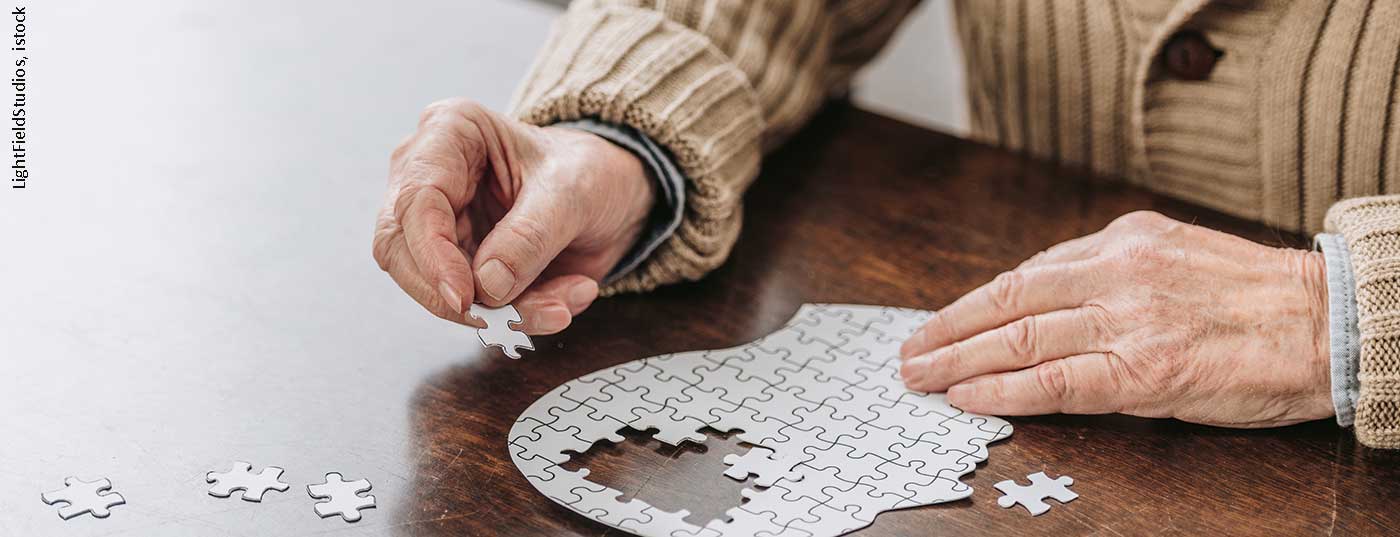Dementia is an expression and consequence of various diseases. Due to demographic change, the prevalence is steadily increasing. A few years ago, it was possible to uncover a link between dementia and high blood pressure. Therefore, as a preventive measure, effective blood pressure reduction could also reduce the risk of dementia.
In Switzerland, almost 155,000 people are currently affected by dementia. On average, a new diagnosis is made every 18 minutes. By 2040, it is estimated that 300,000 people will have dementia [1]. Based on these data, prevalence and effective therapy are of particular importance. Dementia can have different causes. Approximately 50-70% of those affected suffer from Alzheimer’s dementia, with a further 15-25% suffering from a vascular form of the disease [2]. Nevertheless, blood pressure is a risk factor that has been rather underestimated so far. According to one study, the risk of dementia increases from a high-normal systolic value of 130 mmHg [3]. While only 3.7% of the subjects with low pressure developed dementia, 6.3% of the participants with values from 130 mmHg did. Moreover, the most severely affected patients were those who had already suffered from chronic hypertension for a long time.
The question now was whether lowering blood pressure with medication can also positively influence the rate of dementia in accordance with its effect on the risk of stroke and heart attack. Therefore, a meta-analysis evaluated six large cohorts of prospective observational studies [5]. Data from more than 31,000 people without preexisting dementia over age 55 were stratified into two groups. In the first group, participants had normal blood pressure values (<140/<90 mmHg) at the time of study inclusion, and the second group included those with elevated blood pressure values. The proportion of study participants receiving antihypertensive drug therapy varied and ranged from 32.5% to 62.1%.
During the observation period, a total of 3728 study participants developed dementia, 1741 of whom developed Alzheimer’s dementia. It was also shown that the patients who underwent treatment for their hypertension had a significantly lower risk of dementia (HR: 0.88; p=0.019) and even a 16% lower risk of Alzheimer’s disease (HR: 0.84; p=0.021). Researchers therefore agree that hypertension control exerts a positive and clinically relevant effect on the development of dementia.
Consistent treatment shows effect
On the other hand, the substance class with which the affected persons were treated is not decisive. Neither ACE inhibitor, angiotensin II receptor blocker, nor beta blocker, calcium channel blocker, nor diuretic was shown to be superior to the others. The only decisive factor is the target range of below 140/90 mmHg.
It is estimated that one in four adults in Switzerland suffers from arterial hypertension [6]. However, many patients are untreated or inadequately controlled. There are many reasons for uncontrolled hypertension. Often, treatment options are underutilized. The maximum response rate to monotherapy is 30-40%. Therefore, the administration of a twofold combination is now also initially propagated. In contrast to dose escalation, the combination is much more effective [7]. The dual combination has an 80% response rate and also strengthens adherence. This is because up to 70% of patients do not take their medication as prescribed. According to studies, the risk of non-adherence increases from the administration of three tablets daily [8,9].
Prefer fixed combinations
Fixed-dose combinations effectively support the therapeutic regimen in this case. If no effective blood pressure reduction can be achieved under the two-drug combination at optimal dosage, a switch should be made to a three-drug combination, e.g., ACE inhibitor, calcium antagonist, and diuretic.
Literature:
- www.alzheimer-schweiz.ch/fileadmin/dam/Alzheimer_Schweiz/de/Publikationen-Produkte/Zahlen-Fakten/Factsheet_DemenzCH.pdf (last accessed 10/15/2020)
- www.dgn.org/leitlinien/3176-leitlinie-diagnose-und-therapie-von-demenzen-2016 (last accessed on 15.05.2020)
- www.aerztezeitung.de/Medizin/Demenzrisiko-steigt-ab-einem-Blutdruck-von-130-mmHg-308527.html (last accessed on 15.05.2020)
- Abell JG, Kivimäki M, Dugravot A, et al: Association between systolic blood pressure and dementia in the Whitehall II cohort study: role of age, duration, and threshold used to define hypertension. European Heart Journal 2018; 39: 3119-3125.
- Ding J, Davies-Plourde KL, Sedaghat S et al. Antihypertensive medications and risk for incident dementia and Alzheimer’s disease: a meta-analysis of individual participant data from prospective cohort studies. Lancet Neurology 2020; 19: 61-70.
- www.swissheart.ch/herzkrankheiten-hirnschlag/risikofaktoren/blutdruck.html (last call on 15.05.2020)
- Wald DS, Law M, Morris JK, et al: Combination therapy versus monotherapy in reducing blood pressure: meta-analysis on 11,000 participants from 42 trials. Am J Med 2009; 122: 290-300.
- Strauch B, Petrák O, Zelinka T, et al: Precise assessment of noncompliance with the antihypertensive therapy in patients with resistant hypertension using toxicological serum analysis. J Hypertens 2013; 31: 2455-2461.
- Gupta P, Patel P, Strauch B, et al: Risk Factors for Nonadherence to Antihypertensive Treatment. Hypertension 2017; 69: 1113-1120.
InFo NEUROLOGY & PSYCHIATRY 2020; 18(4): 21.











